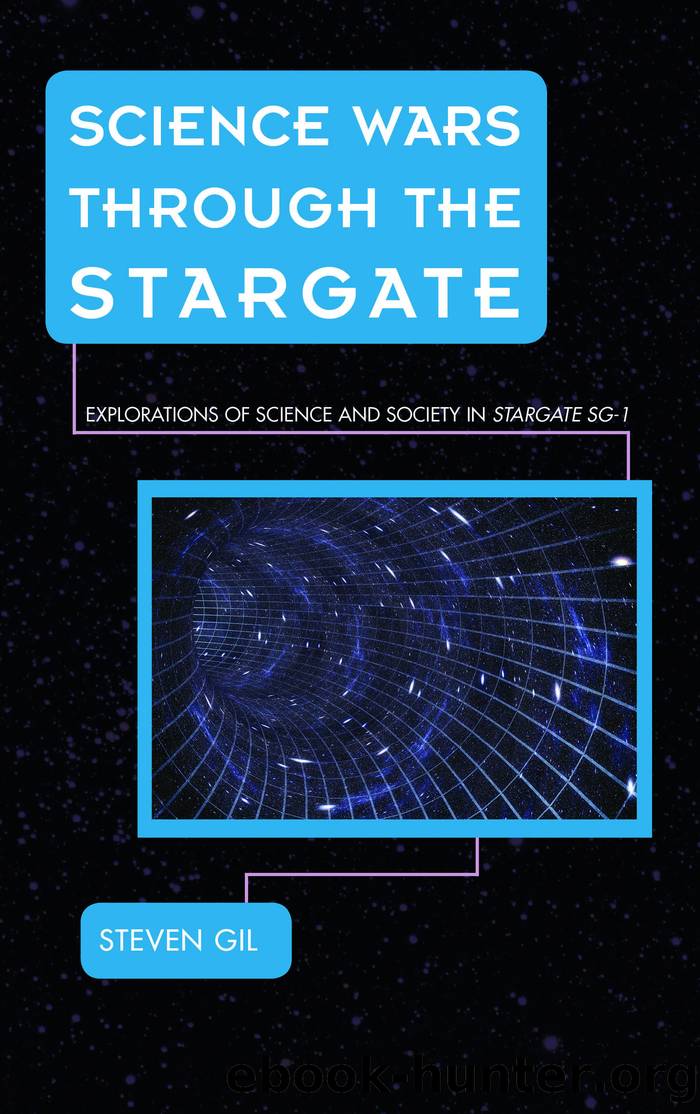Science Wars through the Stargate by Gil Steven;

Author:Gil, Steven;
Language: eng
Format: epub
Tags: undefined
Publisher: Rowman & Littlefield Publishers
Published: 2012-08-15T00:00:00+00:00
The more awkward and nerdish Carter from âMoebius, Pt. 1.â
Military status actually offers another level of distinction and this extends beyond the visual, also impacting her representation as a scientist. That professional vocation counterbalances depictions of the scientist as physically incapable and weak. Referring to the portrayal of Carter as a capable hand-to-hand combatant, Tuszynski observes how âcommon conceptions of âgeeksâ often portray them as intelligent but physically weak and unable to fight. Carter, as an Air Force officer, cannot be this way, and simply being proficient with weapons . . . is not enough for a woman in a field unit.â[32] This typical association of intellectual ability with physical infirmity sheds light on OâNeillâs final comments to Carter in her introductory scene. Once he is told by Hammond that the assignment of Carter is non-optional she reassures him, saying, âIâm an Air Force officer just like you are colonel. And just because my reproductive organs are on the inside instead of the outside, doesnât mean I canât handle whatever you can handle.â[33] Distancing his issue from Carterâs gender, OâNeill replies, âOh this has nothing to do with you being a woman. I like women. Iâve just got a little problem with scientists.â This problem with scientists may be said to stem from the view of them as not fit for the essentially military endeavors that OâNeill and his team must undertake. Carterâs final assertion indicates that this is how she interprets that statement: âColonel, I logged over a hundred hours in enemy airspace during the Gulf War. Is that tough enough for you? Or are we going to have to arm wrestle?â Further support for this reading of OâNeillâs âproblem with scientistsâ can be found in the comments about Jackson that he makes earlier in the episode. When discussing the previous mission to Abydos with OâNeill, Hammond asks, âYou didnât like Daniel Jackson did you?â To which OâNeill replies, âDaniel was a scientist. He sneezed a lot. Basically, he was a geek, sir.â Greater detail about Jackson will come in a later section. What is noteworthy, though, is that the problem with scientists is certainly related to the view that they are poorly suited to the physically demanding military assignment, and not reflective of any issue with science. Here we are dealing with a view that derives directly from stereotypes.
Through her clothing, dialogue, and behavior, Carter is framed as existing within a social settingâthe military. As such, she is not an outsider despite the distinction of her being a scientist. That positioning is significant to the Science Wars, as Stanley Aronowitz comments that the âclaim of science to social neutrality is subject to increasing incredulity since the veritable subsumption, after 1938, of much of U.S. natural science (physics, chemistry, and biology) under the military.â[34] Many of the Earth-based scientists depicted in SG-1 similarly work for the US military. Carter goes a step further than many of the other scientists by actually being an Air Force officer. This means that she is subject to military formality and rules much more so than some others.
Download
This site does not store any files on its server. We only index and link to content provided by other sites. Please contact the content providers to delete copyright contents if any and email us, we'll remove relevant links or contents immediately.
Still Foolin’ ’Em by Billy Crystal(36014)
Spell It Out by David Crystal(35825)
The Great Music City by Andrea Baker(30759)
Professional Troublemaker by Luvvie Ajayi Jones(29409)
Trainspotting by Irvine Welsh(20977)
Call Me by Your Name by André Aciman(19873)
We're Going to Need More Wine by Gabrielle Union(18608)
The Secret History by Donna Tartt(18089)
Cat's cradle by Kurt Vonnegut(14726)
Ready Player One by Cline Ernest(13939)
Molly's Game by Molly Bloom(13872)
Bombshells: Glamour Girls of a Lifetime by Sullivan Steve(13667)
The Goal (Off-Campus #4) by Elle Kennedy(13179)
Leonardo da Vinci by Walter Isaacson(12767)
The Social Justice Warrior Handbook by Lisa De Pasquale(11944)
4 3 2 1: A Novel by Paul Auster(11761)
The Break by Marian Keyes(9067)
Crazy Rich Asians by Kevin Kwan(8864)
Adultolescence by Gabbie Hanna(8575)
